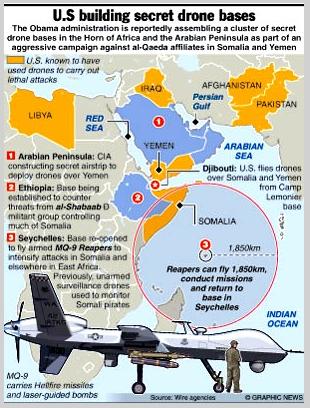|
The most extensive media account seen, to date, has been a 2011 article in theWashington Post. Later, at the height of drone activity, the Sunday Times published this graphic, but little news of further covert building is in the public domain.
Reports of a base in Saudi Arabia (see BBC online and others), supported by public satellite images but officially denied, may be added to an earlier revelation by Sen. Dianne Feinstein, who accidentally stated that the U.S. was flying its robotic aircraft from Pakistani soil. Google Earth’s archives [2006-2009] show Predator drones sitting on a runway not far from the Jacobabad Air Base in Pakistan.
And reports are coming in that the US government is now looking for ideas on how to build its very own ‘helicarrier’. This, and other links, however, lead only to the notice on the left, on the website of America’s Defense Advanced Research Projects Agency [DARPA]. This agency is working on the conversion of existing aircraft into flying aircraft carriers, holding drones – which have a limited flying range – near to where they can be launched, retrieved and maintained. The Washington Post reports that companies, universities and other organizations interested in participating have been invited to submit “system-level conceptual designs,” including a feasibility analysis.

Using military documents, press accounts and other open source information, an in-depth analysis by AlterNet identified over 60 bases integral to U.S. military and CIA drone operations. AlterNet alleges that other bases are already under construction or in the planning stages.
In April, news of a joint investigation by the German news magazine Der Spiegel and The Intercept was published. A top secret U.S. intelligence document obtained by The Intercept, contained slides had been provided by a source with knowledge of the U.S. government’s drone program who declined to be identified, fearing retribution. These confirm – after years of official denial – that the U.S. military base in Ramstein, Germany, is the site of a satellite relay station that enables drone operators in the American Southwest to communicate with their remote aircraft in Yemen, Somalia, Afghanistan and other targeted countries. The top-secret slide deck provided the most detailed blueprint seen to date of the technical architecture used to conduct strikes with Predator and Reaper drones.
Amidst European criticism of America’s targeted killing program, U.S. and German government officials downplayed Ramstein’s role in lethal U.S. drone operations, but slides show that the facilities at Ramstein enable lethal drone strikes conducted by the CIA and the U.S. military in the Middle East, Afghanistan and Africa.
Faisal bin Ali Jaber, a relative of men killed in a drone strike in the Yemen, testified in a German court, alleging that Germany is violating a constitutionally enshrined duty to protect the right to life by allowing the United States to use Ramstein Air Base as part of its lethal drone operations. His case was dismissed at the end of may, but he has leave to appeal.
Is the tide turning? One key drone launching base in Syria closed – how many more to go?
In February the US decided to evacuate its remaining personnel from Yemen, including 100 Special Operations forces from a military base seen as key in the drone war against al-Qaeda.
The Los Angeles Times reported that the United States was also closing its Syrian embassy and World News quotes an account of its withdrawal of 100 Special Operations forces from a military base seen as key in the drone war against al-Qaeda by Iona Craig, a journalist who was based in Sana’a for four years as the Yemen correspondent for The Times of London.
Copyright Drone Warfare 2015
|